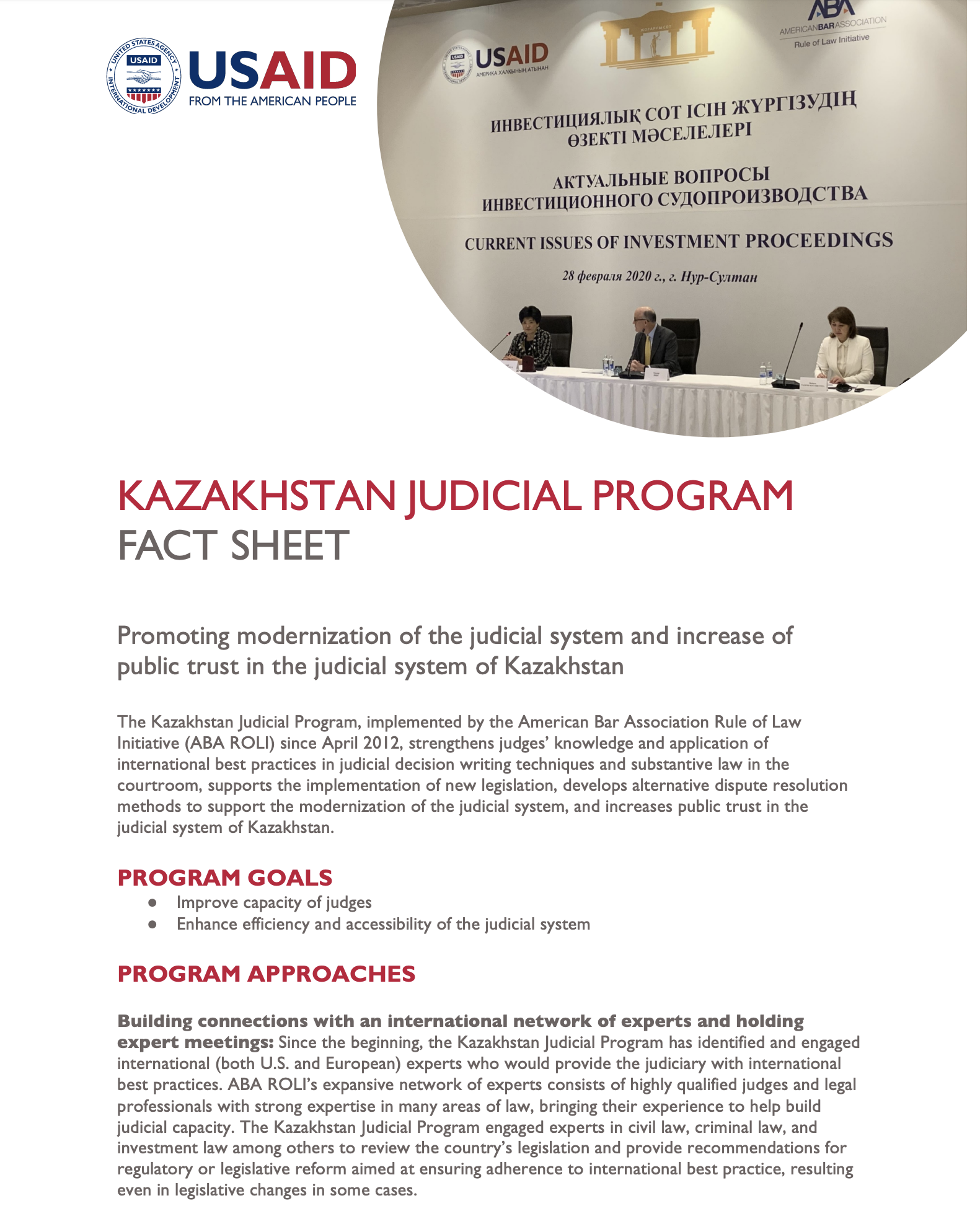Speeches Shim
Kazakhstan Judicial Program ![]() (pdf - 3 MB)
(pdf - 3 MB)
Promoting modernization of the judicial system and increase of public trust in the judicial system of Kazakhstan.
The USAID-funded Kazakhstan Judicial Program, implemented by the American Bar Association Rule of Law Initiative (ABA ROLI) since April 2012, strengthens judges’ knowledge and application of international best practices in judicial decision writing techniques and substantive law in the courtroom, supports the implementation of new legislation, develops alternative dispute resolution methods to support the modernization of the judicial system, and increases public trust in the judicial system of Kazakhstan.
PROGRAM GOALS
- Improve capacity of judges
- Enhance efficiency and accessibility of the judicial system
PROGRAM APPROACHES
Building connections with an international network of experts and holding expert meetings: Since the beginning, the Kazakhstan Judicial Program has identified and engaged international (both U.S. and European) experts who would provide the judiciary with international best practices. ABA ROLI’s expansive network of experts consists of highly qualified judges and legal professionals with strong expertise in many areas of law, bringing their experience to help build judicial capacity. The Kazakhstan Judicial Program engaged experts in civil law, criminal law, and investment law among others to review the country’s legislation and provide recommendations for regulatory or legislative reform aimed at ensuring adherence to international best practice, resulting even in legislative changes in some cases.
Establishing open dialogue between the judicial system and investors: Kazakhstan Judicial Program created an open dialogue to promote direct discussion between the judiciary and investors and to improve investor confidence. This platform fostered the exchange of opinions on creating an environment of trust and transparency for enterprises doing business in Kazakhstan and improving investment dispute resolution. Following these discussions, the Supreme Court laid the basis for legislative changes related to investment dispute resolution, increasing investor confidence in the judicial system.
Increasing the technical expertise of judges: The Kazakhstan Judicial Program contributed to thematic expertise for judges to consider civil and criminal cases. ABA ROLI developed and distributed decision writing manuals and judicial handbooks that gave judges a set of tools to better synthesize and describe the facts of a case and the legal rationale for their decision. This methodology reduced the time to complete the decisions and provided a body of clearly-written, transparent decisions available for anyone to understand the judge’s decisions in a given case. Moreover, regional courts’ learning centers used these manuals for their legal education trainings as well. As a result, more concise and clear decisions made by judges laid a basis for better public understanding of their interactions with the courts.
PROGRAM ACHIEVEMENTS
- Established dialogue between the judiciary and investors: Kazakhstan Judicial Program created an open forum for courts and investors to exchange information, ideas and experience. This increased investor confidence in the justice system of Kazakhstan, which resulted in positive implications for investment legislation.
- Contributed to positive legislative and regulatory changes: Under Kazakhstan Judicial Program, judges and other government agencies participated in discussion of relevant issues of current legislation. At the discussions, participants have adopted recommendations on amending legislation. Following these recommendations, the judiciary instituted legislative changes and adopted new normative regulations including one on the judicial application of criminal procedure legislation that specified the basis and conditions in which a case may be returned to the prosecutor.


Comment
Make a general inquiry or suggest an improvement.